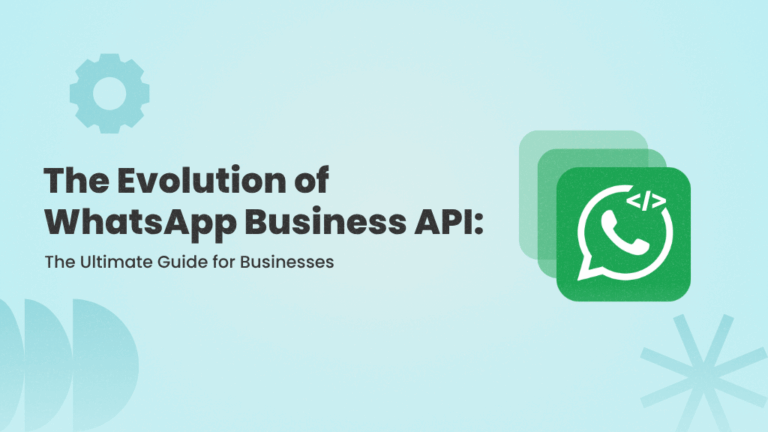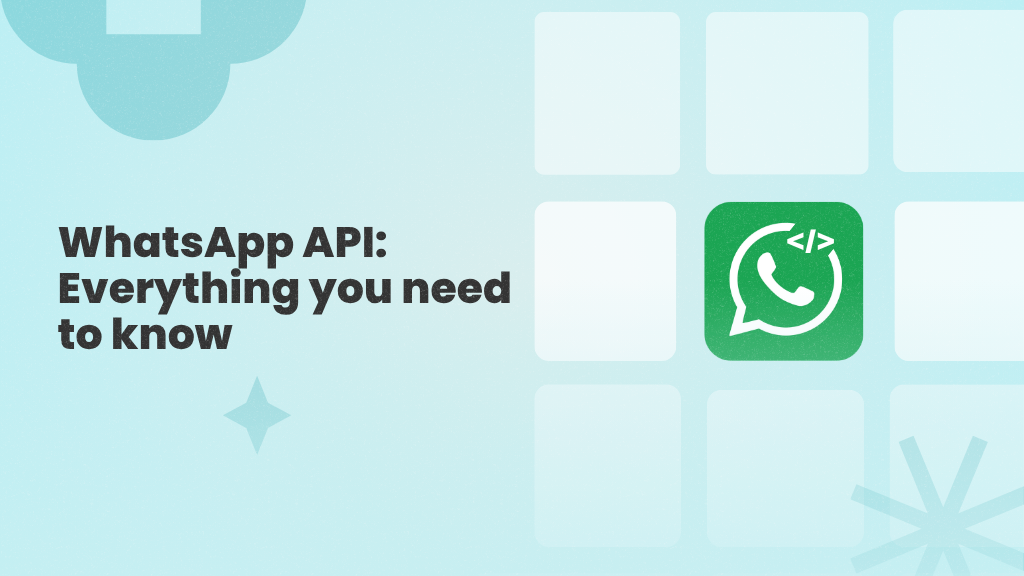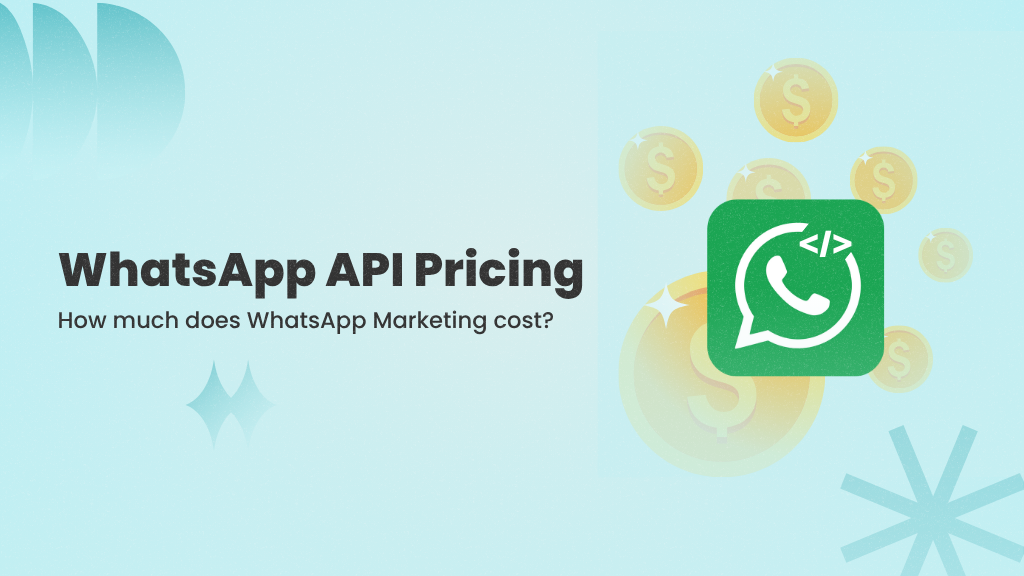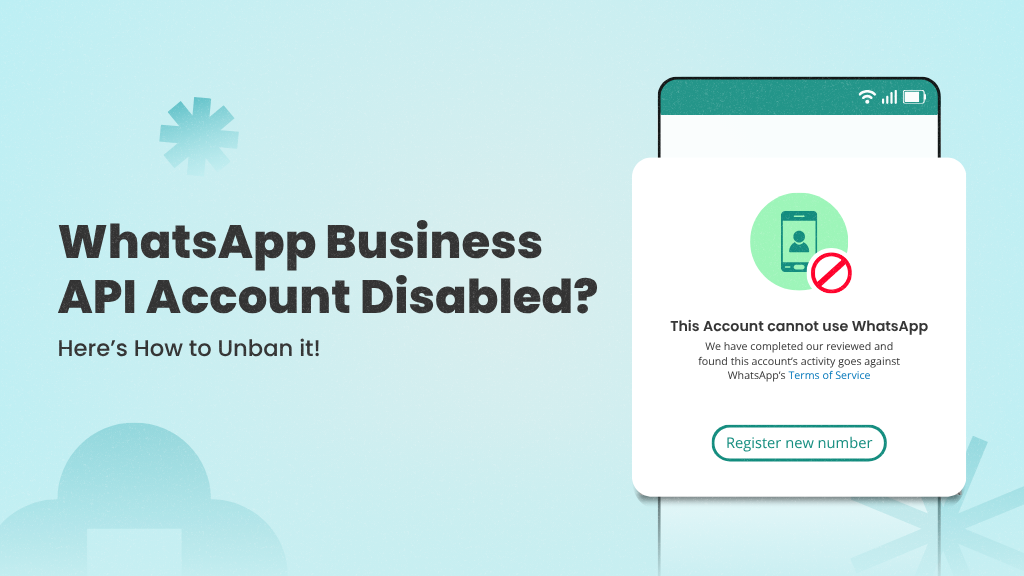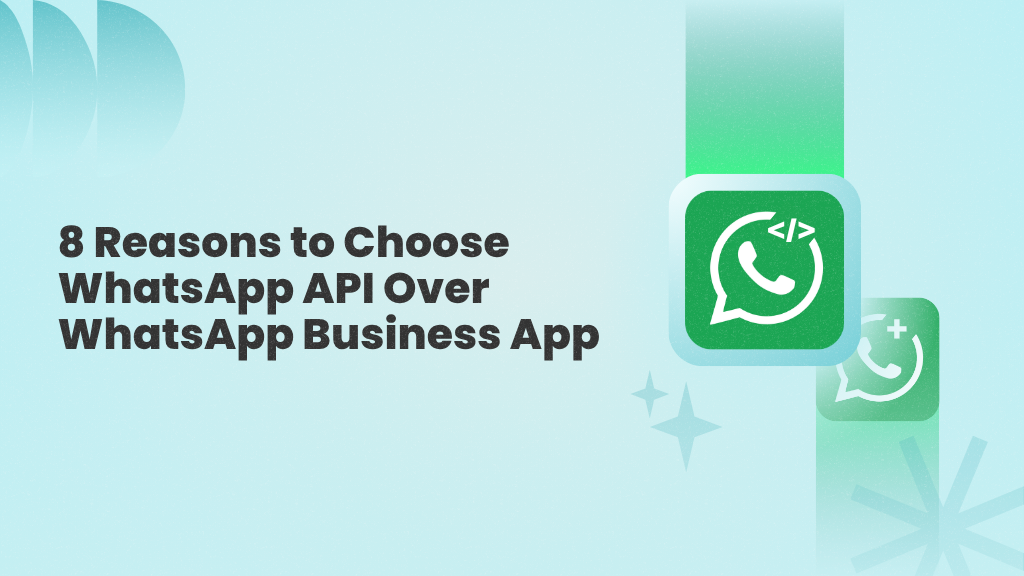WhatsApp Business API also known as WhatsApp Business Platform was launched in the year 2018 as a means for businesses to leverage WhatsApp as a platform for marketing purposes. WhatsApp API is a cloud-based API that has transformed how businesses interact with their customers via WhatsApp. Over the years WhatsApp has evolved from a simple personal messaging app to an exemplary tool for conversational commerce.
In this article, we will explore the fascinating journey of WhatsApp Business API in particular and how it became the widely popular marketing tool that is used by businesses of all sizes to better communicate and engage with their customers. We will also take a look at the promising and highly anticipated future of the most loved marketing platform.
WhatsApp Business API: The Past
Let us take a short history lesson about the founding of WhatsApp, the basis for WhatsApp Business API and the WhatsApp Business app.
WhatsApp was founded by Brian Acton and Jan Koum in the year 2009 in California, United States. Acton and Koum founded WhatsApp after quitting their jobs at Yahoo!
Acton and Koum were advised by another person whose name was Alex Fishman who introduced them to Igor Solomenikov, an iOS developer they found on RentACoder.com. Following this Koum succeeded in building the iOS application and WhatsApp Inc was incorporated on 24th February 2009 in California.
The seed funding of $250,000 for WhatsApp was sponsored by Brian Acton’s former colleagues at Yahoo! This happened in October 2009.
The beta stage ended in November 2009 and was launched exclusively for iOS. Following this Jan Koum hired Chris Peiffer to make the BlackBerry version of the app which they launched two months later.
As business expenditure kept increasing WhatsApp was changed into a paid model costing users $0.99 to get in. However, this paid model only lasted for a short while until they secured funding from Sequoia Capital.
In 2011, Jim Goetz, a partner of Sequoia Capital succeeded in meeting the duo and became a strategic advisor by investing 8 million dollars in exchange for 15% of the firm.
Two years later, in 2013, as the number of users grew to over 200 million, Sequoia Capital was invited to another round of funding in which they invested $50 million dollars valuing the startup at a whopping $1.5 billion.
In 2014 Facebook acquired WhatsApp for an astounding $19 billion resulting in what would be known as one of the greatest acquisitions in tech history.
In 2017, WhatsApp launched the WhatsApp for Business app which was built for small businesses to create their business profiles for free on WhatsApp. The free WhatsApp Business app proved to be a fantastic tool that enhanced communication and engagement for small companies and organizations.
The founders Brian Acton and Jan Koum, the dynamic duo who actually built WhatsApp from scratch decided to leave the company in 2017 following disputes with Facebook (now known as Meta) over the company’s policy on data privacy and new business model. Brian Acton went on to build his own non-profit organization called Signal with privacy as its core value.
The release of the WhatsApp for Business app soon prompted the release of a similar solution for medium and large-sized enterprises to capitalize on.
On August 1, 2018, due to popular demand, WhatsApp Business API was officially launched as WhatsApp’s first way to make money. WhatsApp Business API enables medium and large-sized enterprises to integrate the platform’s API with their own business to provide a seamless experience to their customers by communicating all the important details on WhatsApp.
Unlike the free WhatsApp for Business app, WhatsApp Business API requires businesses to apply for access through its many BSPs and tech partners like us, WANotifier.
Read more about the different types of WhatsApp to get to know each of them better and how each one can help you in your business.
Major Changes in WhatsApp Business API Since its Launch
WhatsApp Business API has undergone quite a few changes since its launch in 2018. The initial value proposition offered by WhatsApp Business API was as follows:
- Scalability: Unlike the free WhatsApp for Business app, WhatsApp Business API supports an unlimited number of devices and users under one account which makes it ideal for larger corporations.
- Personalization: Using CRM integrations, businesses can send media templates with quick reply buttons or call-to-action buttons and personalized messages providing individual attention to each customer.
- Bulk messaging and automation: WhatsApp API made it possible to send personalized messages in bulk to a large number of people simultaneously with a single click of a button. WhatsApp API also supports automation features like automated messaging and chatbots with the latest development integrating AI with chatbots to maximize efficiency and provide comprehensive solutions to customers.
- End-to-end encryption: WhatsApp ensures top-notch privacy and security by providing end-to-end encryption.
- Rich media support: Companies could send images, videos, documents, PDFs etc to make interactions more creative. The latest advancement is the ability to send carousel posts via WhatsApp.
- Message templates: Businesses can create personalized templates and get them approved by WhatsApp for various utilities like payment confirmations, shipping status, discounts and offers etc.
From 2019-2021, WhatsApp expanded access to its API by partnering with major BSPs like Twilio, MessageBird and 360dialog to increase adoption and the number of customers. Soon businesses across all industries including finance, healthcare and e-commerce started leveraging the API to enhance customer experience.
Following this, a series of updates and new features rolled out. Let us take a quick glimpse of the most prominent updates.
In May 2022, WhatsApp introduced the WhatsApp Cloud API which opened up doors for new providers to enter the market and create innovative software solutions for the API. Earlier businesses could access the API only through BSPs. This also made it easier for businesses to integrate without complex hosting requirements.
In 2022, major policy and pricing changes were made which are followed till today. Earlier businesses were charged for every message that they sent. WhatsApp later shifted this to a conversation-based pricing model in which businesses had to pay for a 24-hour interaction window with a customer. Learn about the current WhatsApp API pricing.
In July 2024, WhatsApp changed the famous green tick to a blue tick that is given to verified businesses.
WhatsApp Business API: The Present
The current scenario of WhatsApp Business API is proof of its effectiveness with more and more businesses hopping on looking to take advantage of its powerful suite of tools. Currently, there are over 5 million businesses using the WhatsApp Business API.
The current features of WhatsApp API include the initial features along with the following new benefits:
- Cloud-based API: In 2022, Meta launched the WhatsApp Cloud API which is a free cloud-hosted variation of WhatsApp Business API. This enables faster setup and lower costs since there is no hosting requirement. It also gave businesses more control over their data and security.
- Conversational commerce: Businesses can now automate their product catalogs and use chatbots for lead generation, order processing and appointment booking.
- Payment Integration: Currently only available in Brazil and India. Businesses can now offer in-chat payments.
- Advanced automation and AI integration: With the AI boom in recent years, AI has become the talk of the town. WhatsApp API has caught up and now allows the integration of complex generative AI models like GPT-4 and Deepseek into WhatsApp chatbots. Isn’t that really cool? Now AI-powered chatbots can be employed to serve hyper-personalized solutions to customers.
- New templates: WhatsApp API has introduced new templates like carousel templates, limited-time offer templates, catalog templates and location templates.
Click here to learn more about the latest WhatsApp statistics and trends. Now that we have seen the past and the present, aren’t you curious and excited to see what the future of WhatsApp API holds? Let’s explore what’s in store for tomorrow.
WhatsApp Business API: The Future
The future of WhatsApp Business API is highly optimistic and very promising. The monthly active users (MAU) of WhatsApp Business have been growing at a rate of 55% annually since 2020. Here are a few features and improvements we can expect in the near future:
Voice AI and Speech Recognition
Future updates of WhatsApp Business API may introduce voice-activated chatbots for hands-free conversations. Speech-to-text and text-to-speech AI may be introduced which will make it easier and much more accessible for customers. Personalized voice responses wherein an AI replicates a sales representative’s voice for a more human-like experience.
Expansion of WhatsApp Pay
WhatsApp’s payment features which are currently only available in India and Brazil will most likely expand to several countries around the world. If this happens WhatsApp would play the role of a messaging app as well as a fintech app. This will enable businesses across the world to receive payments from WhatsApp without having to redirect to any external app. WhatsApp may also introduce blockchain and enable payments using cryptocurrencies.
Voice API
WhatsApp may have plans to soon introduce voice API. Voice API is a program that allows businesses to integrate voice-based communication features into applications, websites or services. This could potentially change how WhatsApp is used as a marketing platform in the future.
Return of Per-Message Pricing
WhatsApp is returning to its original per-message pricing model while ditching the current conversation-based model. This change is expected to come into effect from May 1st, 2025. This means that Meta will charge businesses for every message they send rather than a single fee covering all messages that are sent within a 24-hour window. Businesses need to plan ahead as this may change the way they create and manage their messaging strategies.
Summing Up
WhatsApp Business is a revolutionary leap in conversational commerce and marketing. It has shown consistent growth throughout the years since its release in 2018. The future of WhatsApp Business API is bright and promising.
If you are considering getting access to WhatsApp Business API for your business then this is the right time to do so. With constant updates and improvements, WhatsApp marketing using WhatsApp API is proven to be the most cost-effective mode of marketing with the highest success rate.
Businesses that have chosen to add WhatsApp Business API to their arsenal have seen nothing but growth and a surge in their profits and it is not going to be different for your business. So begin your journey with WhatsApp API today.

